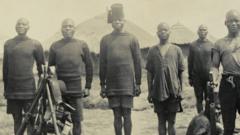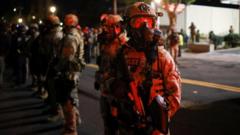Why Are Kenya's World War Soldiers Still Forgotten?

Published: 2025-11-08 01:00:14 | Category: world
The story of Mutuku Ing'ati, a Kenyan soldier who disappeared during World War II, highlights the often-overlooked contributions of African soldiers to the British military efforts. After 85 years, his family has recently discovered his fate through military records, showcasing the need for recognition of countless others like him who served and sacrificed without acknowledgment.
Last updated: 14 October 2023 (BST)
What’s happening now
Recently, the Commonwealth War Graves Commission (CWGC) contacted the family of Mutuku Ing'ati, revealing his enlistment in the British army during World War II. This discovery has reignited interest in the often-ignored narratives of African soldiers who served in the British forces. The CWGC is actively working to uncover the stories of these soldiers and locate the resting places of those who were never returned home, addressing a significant gap in the historical record.
Key takeaways
- Mutuku Ing'ati disappeared in 1943 after enlisting in the British army.
- His family learned of his fate through newly unearthed military records.
- The CWGC is seeking to identify and commemorate the contributions of Kenyan soldiers.
- Newly found records have revealed the names and histories of over 3,000 African soldiers.
- Efforts are underway to integrate these stories into Kenya's educational curriculum.
Timeline: how we got here
Here is a brief timeline of key events surrounding the search for Kenyan soldiers like Mutuku Ing'ati:
- June 1943: Mutuku Ing'ati is killed in action in World War II, with no notification sent to his family.
- 2023: The CWGC contacts Ing'ati's nephew, revealing his military history and the circumstances of his death.
- 2023: The CWGC, with the help of the Kenyan Defence Forces, uncovers historical military records from World War I and II.
- Future: Ongoing efforts to locate burial sites and commemorate those lost African soldiers.
What’s new vs what’s known
New today/this week
The recent engagement of the CWGC with the family of Mutuku Ing'ati marks a significant step in acknowledging the contributions of Kenyan soldiers. The recovery of over 3,000 names from previously believed lost records highlights the importance of this work and the need for further exploration into the contributions of African soldiers during both World Wars.
What was already established
For years, the narrative surrounding African soldiers in the British military has been one of silence and absence. Many families have lived with the pain of unresolved loss, unaware of the service and sacrifice of their relatives. The historical documentation of these contributions has been sparse, making recent discoveries even more significant.
Impact for the UK
Consumers and households
The uncovering of these histories has significant emotional implications for families in Kenya and beyond. The stories of these soldiers highlight the global impact of the world wars and remind us of the human cost of conflict. It fosters a deeper understanding and appreciation of the diverse contributions to British military history.
Businesses and jobs
For organisations involved in historical research and commemoration, such as the CWGC, this initiative may lead to increased funding and support for archival projects. Additionally, educational institutions might find new opportunities to incorporate these narratives into their curricula, creating jobs in education and research.
Policy and regulation
This initiative could prompt discussions at the level of UK and Kenyan policymakers, potentially leading to new agreements on how to commemorate these soldiers. It may also influence how military history is taught in schools, promoting a more inclusive narrative that recognises contributions from all backgrounds.
Numbers that matter
- 180 km (110 miles): The distance Mutuku Ing'ati travelled from his home to enlist in Nairobi.
- 3,000: The number of identified African soldiers from newly discovered military records.
- 85 years: The time elapsed since Ing'ati's disappearance until recent discoveries were made.
- 13 months: The duration Abdulla Fadlumulla served before being killed in World War I.
- 44 years: The age at which George Williams died, notable for his service and bravery.
Definitions and jargon buster
- Commonwealth War Graves Commission (CWGC): An organisation responsible for the commemoration of Commonwealth military personnel who died in the two world wars.
- East African Scouts: A regiment of the British army during World War II, comprised mainly of soldiers from East Africa.
- King's African Rifles: A regiment of the British army formed from African soldiers to fight in World War I and II.
How to think about the next steps
Near term (0–4 weeks)
The immediate focus will be on the continued research efforts by the CWGC to identify additional soldiers and their stories. Families might be encouraged to share their histories or inquire about their relatives' military service.
Medium term (1–6 months)
As more records are recovered, there may be increased public awareness and media attention surrounding this initiative. Potential memorials may be planned, and educational institutions may begin integrating these narratives into their curricula.
Signals to watch
- New announcements from the CWGC regarding additional discoveries of soldiers' records.
- Updates on memorials or commemorative events planned for the identified soldiers.
- Changes in educational curriculums that include the stories of African soldiers.
Practical guidance
Do
- Engage with local historical societies to learn more about the histories of soldiers from your community.
- Support initiatives that aim to document and commemorate the contributions of diverse groups in military history.
- Encourage educational institutions to include comprehensive histories in their curricula.
Don’t
- Don’t overlook the contributions of non-European soldiers in historical narratives.
- Don’t dismiss the importance of personal stories in understanding history.
- Don’t hesitate to ask questions about family histories related to military service.
Checklist
- Research family military history, especially any relatives who may have served in the world wars.
- Stay informed about the CWGC's initiatives and discoveries.
- Participate in local history events or discussions focused on military contributions.
- Advocate for inclusive historical education in schools.
- Share the stories of known soldiers in your community to preserve their memories.
Risks, caveats, and uncertainties
While the recent discoveries are significant, there are still many uncertainties surrounding the exact locations of burial sites for many soldiers. The records recovered may not be exhaustive, and some stories may remain untold. Ongoing research is crucial to fill these gaps, but it is important to approach the topic with a recognition of the limitations of the available data.
Bottom line
The newfound recognition of African soldiers, exemplified by the story of Mutuku Ing'ati, underscores the need for comprehensive acknowledgment of their sacrifices during the world wars. As efforts continue to uncover these histories, it is essential for societies to embrace and honor the contributions of all individuals, ensuring that their legacies are remembered and celebrated.
FAQs
What happened to Mutuku Ing'ati?
Mutuku Ing'ati enlisted in the British army during World War II and was killed in action on 13 June 1943, with his burial site remaining unknown.
Why is the CWGC investigating African soldiers' records?
The CWGC aims to commemorate the contributions of African soldiers in the world wars, ensuring their stories are included in military history.
How can I learn about my family's military history?
Research local historical records, engage with veterans' organisations, and inquire about family stories to uncover your relatives' military service.



